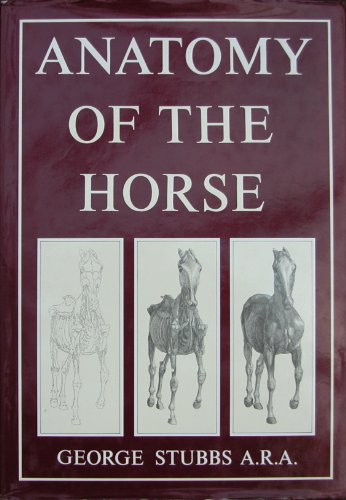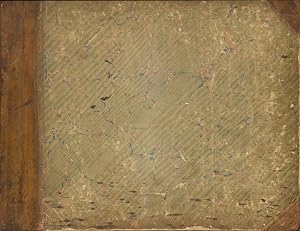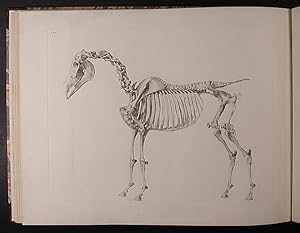Anatomy Horse by George Stubbs, First Edition (3 results)
FeedbackSearch filters
Product Type
- All Product Types
- Books (3)
- Magazines & Periodicals (No further results match this refinement)
- Comics (No further results match this refinement)
- Sheet Music (No further results match this refinement)
- Art, Prints & Posters (No further results match this refinement)
- Photographs (No further results match this refinement)
- Maps (No further results match this refinement)
- Manuscripts & Paper Collectibles (No further results match this refinement)
Condition
- All Conditions
- New (No further results match this refinement)
- Used (3)
Binding
- All Bindings
- Hardcover (3)
- Softcover (No further results match this refinement)
Collectible Attributes
- First Edition (3)
- Signed (No further results match this refinement)
- Dust Jacket (1)
- Seller-Supplied Images (2)
- Not Print on Demand (3)
Language (2)
Free Shipping
Seller Location
Seller Rating
-
Hardcover. Condition: As New. Dust Jacket Condition: Very Good. 1st Edition. Hardcover Book Condition: As New Dustcover Condition: Very Good George Stubbs was one of Britain's most innovative artists. Such is the present reputation of his paintings, with their astonishingly convincing renderings of both animals and people, that it is easy to forget how much of his success was based on rigorous scientific observation. In 1756, Stubbs rented a remote farmhouse, where he erected a scaffolding to hold the cadavers of horses as he dissected and drew them. After 18 months of single-minded dedication, Stubbs produced the drawings for The Anatomy of the Horse, which he later etched himself. The result was a sensation. Letters of congratulation poured in from scientists all over Europe, amazed not only at the perfection of the finished work, but that it had been produced without patronage. It remained a textbook for artists and scientists for well over a century, and to this day, the strange, spare beauty of these prints continue to fascinate. This is an outstanding book with superb art work. Would make an perfect gift for an animal art lover.
-
The Anatomy of the Horse. Including A particular Description of the Bones, Cartilages, Muscles, Fascias, Ligaments, Nerves, Arteries, Veins, and Glands
Published by Author and printed by J. Purser, London, 1766
Language: English
Seller: Madoc Books (ABA-ILAB), Llandudno, CONWY, United Kingdom
First Edition
Hardcover. Condition: Near Fine. STUBBS George (illustrator). 1st Edition. First edition, First issue, 1766, 24 fine engraved plates with a wonderful provenance. In re-backed contemporary half calf over blue marbled boards, some blind tooling, edges bumped & worn. Spine with gilt tooling, plus gilt titles to the original calf label. Internally, title & reader leaves followed by 24 fine engraved plates, all washed, depicting 36 horses, accompanied by 47 printed pages (some light browning), lacking the errata slip, a few leaves with 1 or 2 tiny pin holes to margins, 'To the Reader' and final leaf with repaired tears to verso, small ink stamp to title and one other text leaf, a couple of other minor professional repairs, marbled endpapers, preserved in modern cloth drop-back box. (560*444 mm). (Huth p42; ESTC T147211; Garrison and Morton 308.1; Lennox-Boyd Stubbs, pp. 165-188; Mellon Books on the Horse and Horsemanship 57; Nissen ZBI 4027). A very good copy of this landmark work on equine anatomy. This copy in the first issue, without watermarks and on laid paper. The artist, previously renowned as a portrait painter, became synonymous with depicting horses after this work was published. It highlighted his supreme draughtsmanship & observational talents. Provenance: Royal Veterinary College (ink library stamp). This copy came from the private collection of the late book dealer and collector, Norman Comben, who was permitted to purchase a few duplicate copies from the RVC library in return for a detailed cataloguing of their collection many years ago; Dr Niall Kenny (small circular bookplate).
-
The Anatomy of the Horse: Including a Particular Description of the Bones, Cartilages, Muscles, Fascias. Ligaments, Nerves, Arteries, Veins, and Glands
Published by J. Purser for the Author, London, 1766
Seller: Donald A. Heald Rare Books (ABAA), New York, NY, U.S.A.
First Edition
Large oblong folio. (18 1/16 x 23 1/2 inches). On laid paper with text and plates mounted on guards throughout. 24 etched plates all by Stubbs. Expertly bound to style in 18th-century half Russia over 18th-century marbled paper-covered boards, spine gilt in seven compartments with raised bands, red Morocco lettering-piece in the second compartment, the others with elaborate overall repeat decoration built up from various small tools. (Some expert restoration). "A landmark in the history both of anatomy and art." (Ray). First edition, first or early issue on laid paper. One of a select group of books which can be said to have "revolutionized men's understanding of the natural world" (Lennox-Boyd). The etchings have a "fine exactness and austere beauty" that "give them a timeless beauty" (Ray). The desirability of this work is vastly increased if the plates are printed on the thick laid paper, used for the 1766 first issue and for most other copies published during Stubbs's lifetime: the printing of the plates shows a precision that is somehow lacking in the later impressions printed on wove paper. The present example is printed on laid paper throughout. Examples on laid paper are increasingly difficult to find - even the Duke of Gloucester's copy (which sold for over $34,000 at auction in London) was on wove paper. Stubbs produced the drawings over an 18 month period, working from a number of "models" and keeping each carcass in his studio for as long as six or seven weeks. In order to produce this work he taught himself how to etch, as he had been unable to find an engraver. "The work appeared in 1766, and remained the standard authority on the subject for nearly a century . . . In 1771 . . . Camper . . . whose work on the relationship of art to anatomy had won international recognition, wrote to Stubbs, comparing his work with that of the great Albinus, whose Tabulae Sceleti et Musculorum Corporis Humani had appeared in 1749. It is entirely appropriate to rank The Anatomy of the Horse with Thomas Pennant's British Zoology (1770) and Gilbert White's Natural History of Selbourne (1789), among the most important of the several works of this time which, by emphasizing the importance of precise systematic observation, revolutionized men's understanding of the natural world" (Lennox-Boyd). Dingley Comben 600. Eales (Cole) 1840. Garrison-Morton 308.1. Huth p.42. Lennox-Boyd pp.165-168. Nissen ZBI 4027. Norman 2032 (later issue). Podeschi, Mellon Collection 57. Ray p.6. Sparrow pp.165-188.




